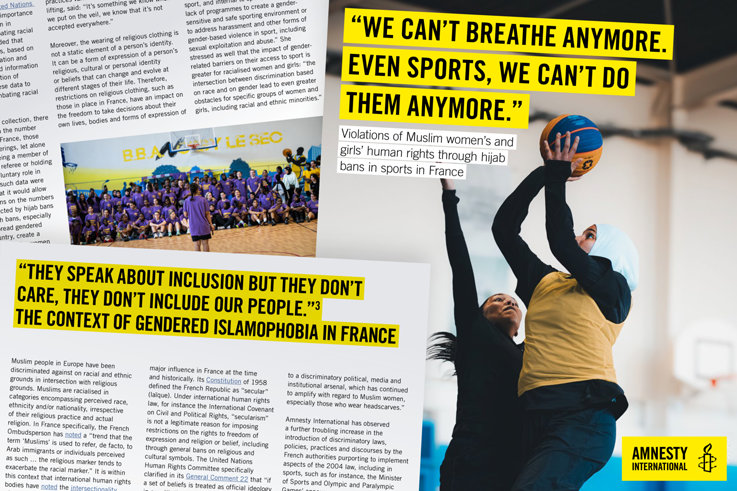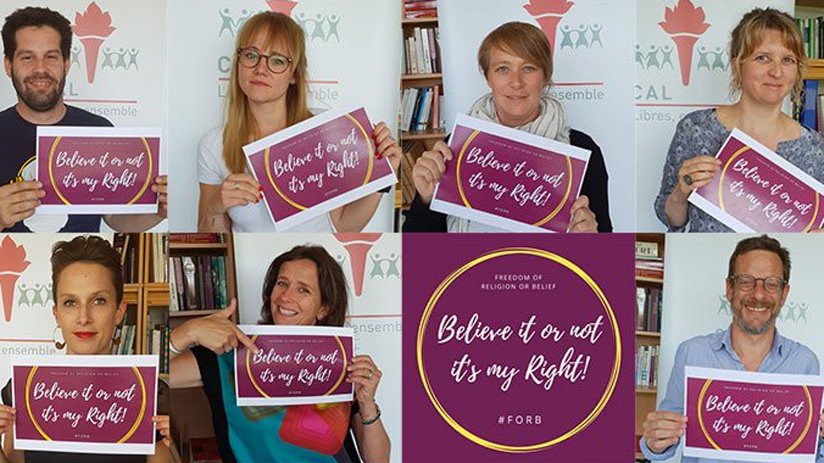
-
HOME
-
WHAT IS STANDOur Mission Our Values Our Help Contact
-
WHAT WE FIGHT FORReligious Freedom Religious Literacy Equality & Human Rights Inclusion & Respect Free Speech Responsible Journalism Corporate Accountability
-
RESOURCESExpert Studies Landmark Decisions White Papers FAQs David Miscavige Religious Freedom Resource Center Freedom of Religion & Human Rights Topic Index Priest-Penitent Privilege Islamophobia
-
HATE MONITORBiased Media Propagandists Hatemongers False Experts Hate Monitor Blog
-
NEWSROOMNews Media Watch Videos Blog
-
TAKE ACTIONCombat Hate & Discrimination Champion Freedom of Religion Demand Accountability
Amnesty International Decries France’s Olympic Hijab Ban
In strongly worded terms, an Amnesty International report condemns France’s hijab ban for its Olympic athletes. The July report accuses France of “discriminatory policies against Muslim women” in competitive sports and in everyday society, and of using the nation’s policy of laïcité, or secularism, to justify it.

In response to the French Sports Ministry’s September announcement that France would bar its delegation from wearing headscarves during the competition, the UN Human Rights Office declared, “No one should impose on a woman what she needs to wear or not wear.”
Now, with the gravitas of an Amnesty International report, global disapproval has increased against France.
“No other country in the region… has enshrined bans on religious headwear such as those worn by some Muslim sportswomen and girls.”
Anna Błuś, a researcher for Amnesty International who helped produce the report, said France’s efforts to organize the “first ever gender-equal Olympics” are meaningless if the country continues to discriminate against its own Muslim athletes.
“We find this very hypocritical to say that you care about women’s equality and women’s participation in sports while at the same time effectively banning Muslim women who wear hijab and other forms of religious clothing from participating in these games,” she said.
The report cites numerous violations including the provisions of the International Olympic Committee’s (IOC) human rights framework, the International Covenant on Civil and Political Rights, the International Covenant on Economic, Social and Cultural Rights, and the International Convention on the Elimination of All Forms of Racial Discrimination.
In May, Amnesty International and nine other human rights organizations sent a letter to the IOC’s president insisting that the committee reverse the French ban, stating, “The hijab bans in sports have resulted in many Muslim athletes being discriminated against, invisibilised, excluded and humiliated, causing trauma and social isolation—some have left or are considering leaving the country to seek playing opportunities elsewhere.”
A month later, the IOC’s response reiterated that the ban only applied to French athletes and didn’t apply to Muslims in other countries.
Błuś dismissed the response, pointing out that France applied to the IOC to host the 2030 Winter Olympics, and it could have been a simple matter of denying the application unless France overturned the ban. “They are just washing their hands and saying France has the right to do this. This is not true. It’s very disappointing and very weak,” she said.
Błuś accused the French of targeting “certain people. And it’s very clear that it’s very often Muslim people.”
Highlighting the fact that France is out of step with its neighbors regarding religious freedom, the Amnesty report compared the French clothing and equipment regulations for volleyball, football and basketball to those of 38 European countries, finding France the “jarring exception on the map of Europe.”
The report stressed that “no other country in the region, at the level of national laws or individual sports regulation, has enshrined bans on religious headwear such as those worn by some Muslim sportswomen and girls.”
In the amateur arena, too, preventing women from wearing hijabs would prevent Muslim athletes from ascending to the level of elite competition.
The French strictures on Muslim religious garb extend far beyond sports and impact everyday life and health, according to the report. The law forbidding burkinis, for example—a modest swimsuit Muslim women wear at the beach or the pool—is cited as an example of a violation of the human right to health and a threat to Muslim women in a time of rising global temperatures.
Amnesty’s report quoted a French soccer player saying that, as a result of the ban, she and her fellow Muslim female athletes have to choose “between our hijab and what we love, between our dignity and just wanting to play a sport.”






